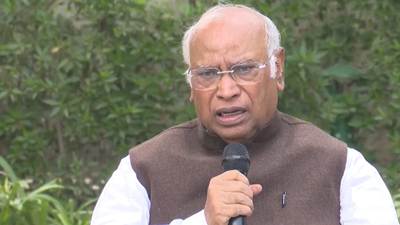NEW DELHI: Congress president Mallikarjun Kharge on Friday called for a ban on the Rashtriya Swayamsevak Sangh (RSS), linking it to what he described as widespread law and order problems in the country. “It is my personal opinion, it should be done,” Kharge said when asked whether the RSS should be banned, adding that “most of the issues and law and order problems are arising because of the BJP-RSS.”Referring to the Congress’ role in India’s freedom struggle, Kharge said, “People today comment on a party whose members sacrificed their lives for the country. But if we say something about the RSS, we are directly attacked.” Citing Sardar Patel’s letter to Syama Prasad Mookerjee dated 4 February 1948, he added, “The way the RSS expressed joy over Mahatma Gandhi’s death had worsened the situation, leaving the government with no choice but to act against it. Reports confirmed that the activities of the RSS and Hindu Mahasabha created an atmosphere that led to Gandhi’s assassination.”
Speaking at a press conference in Delhi, Kharge accused the Modi government of rewriting history and distorting the legacy of national icons. “On 9th July 2024, the Modi government lifted the 58-year-old ban on government employees participating in RSS activities. We demand that this lifting be set aside. The organisation was banned by Sardar Vallabhbhai Patel,” he said.Kharge criticised Prime Minister Narendra Modi for what he described as attempts to distort history. “Recently, references to Mahatma Gandhi, Godse, the RSS, and the 2002 Gujarat riots have been removed from NCERT books. Erasing the truth from textbooks is not right—it reveals their intentions. They always try to turn lies into truth. Our Prime Minister is an expert in this, and his followers are walking the same path. Sardar Patel had banned the RSS to protect secularism,” he said.Responding to PM Modi’s remarks on Sardar Patel’s role in uniting Kashmir, Kharge said the Prime Minister was trying to create a false divide between Patel and Jawaharlal Nehru. “They always tried to portray a rift between Nehru and Patel when they had great ties and both had praised each other,” Kharge said, adding that Patel had called Nehru “an ideal for the country.”


